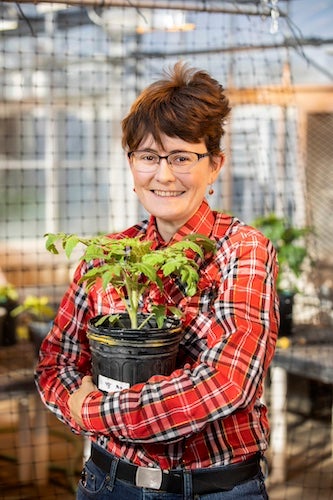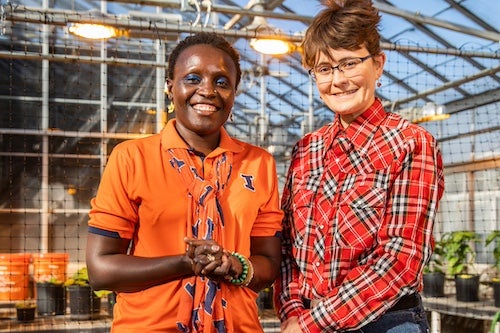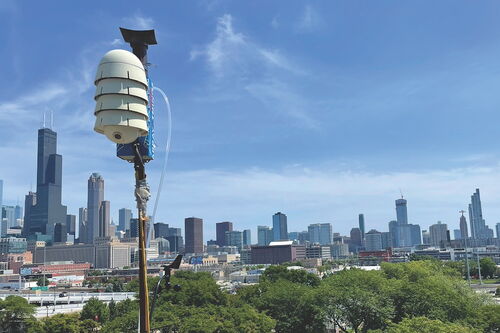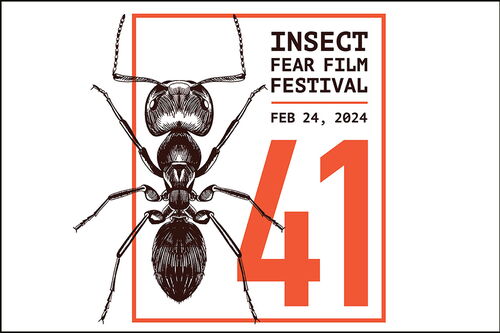The sweetness of science

Have you ever wondered how plants protect themselves from predators? This is a question Erinn Dady addresses in her research as a graduate student in the Department of Entomology.
Dady grew up in Champaign-Urbana. Prior to becoming a plant researcher she worked for several years in local restaurants, including as the head pastry chef at Hendrick House, a private certified housing complex on campus. It was during her work as a baker and chef that she developed an interest in science.
“There are a lot of chemical reactions that are constantly happening in the kitchen,” she said in a profile for the Carl E. Woese Institute for Genomic Biology. “For example, when you make bread, you combine the wet and dry ingredients and transform them into an entirely new material. It made me realize how much science I did on a regular basis… I loved developing new recipes that could accommodate food allergies and I realized that it was a different way of pursuing science.”
Dady earned her General Education Development Diploma at 16, but eventually she decided to go back to school to earn an associate degree at Parkland Community College.
“I thought, that's it, I’m just going to finish my associate’s degree so that I said I did it,” Dady told the College of LAS for this story. When she was at Parkland, however, she learned about a National Science Foundation research experience for undergraduates operated in collaboration between Parkland and the University of Illinois called the Phenotypic Plasticity Research Experience for Community College Students.
The 10-week summer program offered a $6,000 stipend and an opportunity to study phenotypic plasticity, or the phenomenon of single genotypes producing multiple phenotypes. The stipend was critical—it allowed her the financial support to do research full-time.
Dady was accepted into the program and worked the summer of 2018 with Esther Ngumbi, then a postdoctoral researcher in professor May Berenbaum’s lab in the Department of Entomology at U of I. That experience led Dady to enroll at U of I in fall 2019, when once again she worked again with Ngumbi, who had since become a professor and asked Dady to join her research laboratory. Dady worked in Ngumbi’s laboratory while earning an undergraduate degree in Earth, Society, & Environmental Sustainability, and now, as a graduate student, she continues to work there.

Ngumbi said that she feels privileged to be working with Dady.
“Her work ethic and mentoring—always going above and beyond to make all our students feel welcomed to research—is something that I have admired,” Ngumbi said. “Moreover, her commitment to outreach has also been steadfast and very admirable.”
As a graduate student Dady has examined interactions between beneficial fungi, caterpillars, and tomatoes. They’ve found that tomato plants actually grow larger (or produce greater biomass) when they form partnerships with beneficial fungi—even when the plants are being consumed by caterpillars.
Recently the University of Illinois News Bureau produced a story about Dady and Ngumbi’s tomato research. The article was picked up by various news sites, and Dady felt pleasantly surprised that her work was receiving attention. “The work that I’m doing is impactful and I could really make a difference with my research,” said Dady.
She has expanded her studies to understanding how stress combinations impact crops. Specifically, she is looking at the combination of flooding and insect pests, on tomatoes and corn. The Ngumbi laboratory often collaborates with researchers in the College of Agricultural, Consumer and Environmental Sciences and others using computer science in their research. Previous computer science students have helped to streamline the process of statistical data analysis and come to quicker and more informed conclusions.
Dady said crop research is important because it has the potential to combat food insecurity. “The more extreme weather we’ve been seeing the past few years is only going to get worse, and that’s going to directly impact our farmers,” she said.
Dady’s previous work in the local food industry at places such as the Common Ground Food Co-op in Urbana gave her connections to local farmers. Currently, she is involved with research examining the soil at Sola Gratia Farm in Urbana.
“It’s been really nice to come full circle,” said Dady. “I used to make food and now I get to give back to the farmers who are growing our food.”
She loves being a teaching assistant for IB 150, an introductory course for biology majors, and sees herself continuing her career in education through teaching. Dady enjoys and appreciates how the Ngumbi laboratory conducts outreach to introduce people of all ages to science. Dady emphasizes the importance of explaining science in clear terms so it’s not daunting to people outside of the field.
Outside of academics, Dady has a lifelong love for art. She has taught art classes dealing with glass, including creating stained glass pieces (you can see an example of her work inside the Champaign restaurant Watson’s). She loves to combine her passions for art and science to make the things she loves more relatable.
“I just really like to bring science to people and be a friendly, approachable person,” she said.
Editor’s note: Dady will be speaking at Science on Tap at 2:30 p.m. Sunday, April 14, at Riggs Beer Company, 1901 S. High Cross Rd., Urbana.








